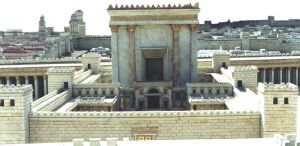Knowing G-d
by Rabbi B. Horovitz;0]
The prophet Moses posed the question, “What is G-d’s name?” (Exodus 3:13) and received the response, “I am that I am.”
This is the root of the ineffable name of G-d, referring to absolute
existence.
Hebrew for “name”, “Shem” from the root “to estimate/measure,” refers to the relationship between observer and the object -. the relativity of all knowledge.
For the truth of the rational processes of the mind, of the existence of the body, of sense-perception and of the physical universe, is based upon unproven postulates. Our rational conception of the universe is limited by time and space, and is relative. Therefore, human thoughts cannot make any claim to absolute truth. However, if everything is relative, there is nothing certain and absolute to which anything can be related.
Fundamentals can, therefore, only be ascertained by the transcendence of reason, by the existential “leap of faith,” which is not a leap in the dark, but a leap into light. Only by breaking through the natural limitations of life can the Absolute, which is the ground of existence, be reached.
If G-d is taken as the starting point of all thought and experience, the homeless spirit finds anchorage. Reason, freedom, values and concrete experience acquire a firm foundation in their relation to the True Absolute One in whose image man has been created. “Vanity of vanities.., all is vanity.., that which has been will be… there is a vicious circle in nature, society and reasoning.., all is governed by relativity… the end of the matter, when all is heard, is: Become aware of G-d and observe His commandments, for this is the whole of man.’ (Ecciesiastes)
“The fundamental of all fundamentals and the pillar of sciences is to know that there is a Prime Being who causes all things to exist. All beings only exist through the truth of His existence. If it could be thought that He does not exist, nothing else can exist, and if it could be thought that nothing apart from Him exists, He alone will exist. All beings are dependent upon, and relative to Him, but He is not dependent upon them. Therefore the truth of His existence is not like the truth of any other being.”‘G-d is truth’ for only He is Absolute Truth, all else is relative truth.” (Maimonides)
Thinkers have stated: “Credo ut intelligam.”“1 believe in order to reason.”“Faith-principles are the foundation of all philosophies.” (
The choice lies between faith in some false absolute, in man, or man-made idols. the construction of our hands, hearts and mind, the service of the self or its projection; or faith in the true Absolute G-d as the measure of all things.
The Ineffable Name of G-d. ‘the Lord” means. that He is the Absolute Being, ‘1 am that I am.’ (Exodus 3:14) Who gives relative existence to all things. Everything has a name. i.e. is related to and caused by other objects, but I, G-d, am the Creator of the Time-Space Continuum. The Hebrew for “to exist,”‘Haya,” is re lated to the root “Haga,” which means ‘to think.” G-d’s essence is absolute existence and thought. Modern philosophy is generally traced back to Descartes, who doubted the truth of all existence. He concluded “cogito ergo sum….! am doubting” everything, the existence of myself. the universe, “it proves that I must exist,” otherwise how could I be doubting? From the truth of his own existence, he came to accept the carol lary – the truth of existence of the universe and of G-d.
According to Judaism, “cogitor ergo sum ““I am thought, therefore I exist;” for man knows that his existence is only relative Absolute existence belongs to the One Who’s existence cannot be related to any other known cause; for He is the cause of all existence. He exists.., because He exists’ am that I am.” He thinks because He thinks His thought has produced human thoucht in man. Man exists because G-d thinks that Hr so exist (Haya). This name means absolute existence, even if there is no world nor man, — The Transcendence of G-d.
The other name of G-d. “El-him “is mentioned in the opening verse of Genesis’“In the beginning. G-d
— El-him — created the heavens and the earth.” The Hebrew word comes from the root “El” meaning a force.” El-him are the non-material forces known to mankind through Nature. This ‘immanence’ of one G-d within the world, is described in the singular Hebrew verb Who ‘created’ (bara’) in the beginning of (time & causality) the heavens (space) and the earth (matter),
Many scientists have declared, “the purpose of science is to find the harmony of nature.” (Einstein) The forces of gravity and electro-magnetism, from nkuement of the galaxies to movement in the subatomic universe, all follow a unified system, for One G-d is constantly creating all.
The iiolvtheists. riot recognizing the unity be- :ween the forces, set up idols that represented power. love, fertility, or wealth. These are the strange Elohim, described with a plural verb, revealed in Nature.
This is the root of Pantheism which existed as a philosophy in Greek times and was developed into its modern form, “De,us sive nattira”. G-d is equivalent to nature,” by Spinoza. It is assumed by the scientific explanations which use the words “the wisdom, laws torcos and harmony of Nature,” with a capital “N’” This is ihe “immanence” of G-d.
It found its religious expression in the worship of nature and the natural inclinations of man in ancient paganism and modern materialism. For if all nature and experience are holy, then the good and bad are equally holy. One can trace a line of descent from Spinoza’s pantheism via Hegel to Marx and Lenin’s communism to modern materialism which exclude any Spiritual Being.
Dualism, which divides the divine spirit from matter, was expressed in ancient times by the doctrine of Zoroaster, which regarded the powers of good and evil as light and darkness which wage an eternal battle. Some eastern religions accept this dualistic nature of the universe and man, opposing body and soul. and pursuing self-abnegation. It is also apparent in the Christian view that man gains redemption by cutting himself off from the influences of the body. The Pope and saints did not marry, in order to be released from the bonds of Satan. The realm of the temporal is divided from the spiritual: — “render unto Caesar that which belongs to Caesar, and unto G-d that which belongs to G-d.”
‘Others, Deists, admit that there must be a G-d Who created the world, but He is separate from, and indifferent to his creation. Or, they reject creation and believe in the eternal existence of matter and of
G-d.
Among thinking men, only the most extreme atheistic materialists would describe the world in terms that there is no G-d at all. But there are some base people who do not attempt to think. “The base man says in his heart there is no G-d.” (Psalms 14:1) This expresses ancient and modern atheism. The base person rejects every moral authority by saying to himself, “only I am the power,” as though he were
G-d.
Unlike the complete falsehood of Atheism, these views of Pantheism. Dualism and Deism are deceptive half-truths. Judaism represents the full truth, which is described in recent philosophy as “Panentheism,” a combination of Deism and Pantheism, the Transcendence of G-d with His Immanence.
The Jewish Mystics declare. ‘He surrounds all worlds, but He also fills all the worlds.’‘The world is not His place, but He is the Place of the world.’ This is not in a spatial, materialistic sense, but as a concept. ‘He dwells high up in the heavens, but comes down low upon the earth.” He is both ‘out there’ and ‘deep within.’ (Psalms 113:5) He is the furthest and the nearest, the highest and the lowest. Though beyond us, He is closest to us. “1 am the Lord (transcendent source of existence — the deeper meaning of the Ineffable Name), and there is none else, apart from me there is no G-d (El-him meaning ‘forces” — the immanence of G-d.” (Isaiah 45:5) From both angles. “there is no other”; the unity between the two is produced by constant creation (creationism).
“Hear 0





